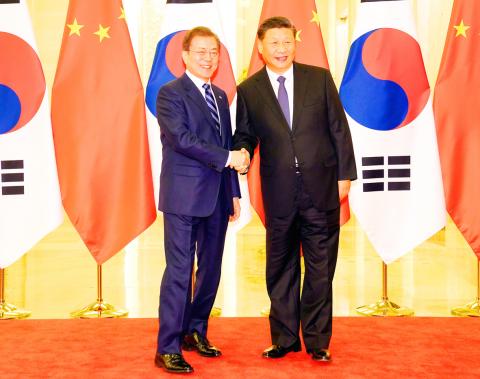The leaders of South Korea and China yesterday said that they look forward to improved ties following a protracted disagreement over the deployment of a US anti-missile system that Beijing considers a threat.
South Korean President Moon Jae-in told Chinese President Xi Jinping (習近平) that while the sides might have felt “disappointed toward each other for a while,” their shared culture and history prevented them from becoming completely estranged.
“It is hoped that South Korea’s dream becomes helpful for China, as China’s dream becomes an opportunity for South Korea,” Moon said in opening remarks before reporters were ushered from the room.

Photo: EPA-EFE
In his opening comments at the meeting at the Great Hall of the People in Beijing, Xi described bilateral ties as “a substantial relationship in the world and an influential relationship among world nations.”
Ties between the neighbors nosedived in 2017 after Seoul accepted the placement of a Terminal High Altitude Area Defense, or THAAD, system in South Korea. Beijing insists its real purpose is to use its powerful radars to peer deep into its territory, rather than to warn of North Korean missile launches and shoot them down.
A furious China launched an unofficial boycott of everything from Chinese tour group visits to South Korea to South Korean television shows, boy bands and other cultural products.
However, it was unable to force South Korea to remove the system and its fury appears to have subsided somewhat amid its trade dispute with the US and tensions elsewhere in Asia.
South Korea now hopes to have Xi visit next year and is also eager to have Beijing use its influence with North Korea to give a jolt to deadlocked denuclearization talks.
While South Korea appreciates the part China has played in that effort, the “current recent situations in which the talks between the United States and North Korea are stalled and tensions on the Korean Peninsula have become heightened are certainly not favorable, not only for South Korea and China, but also for North Korea,” Moon said in his opening comments.
“I hope that we continue to closely cooperate so that the opportunities we have gained with difficulty can come to fruition,” he said.
Separately, Japanese Prime Minister Shinzo Abe met with Xi in Beijing before flying to the southwestern city of Chengdu to join a trilateral meeting today, which Moon is also to attend.
In a press briefing after the Xi-Abe meeting, Masato Otaka — spokesman for the Japanese minister of foreign affairs — said that Abe “urged China to continue its self-restraint” over Hong Kong and expressed “hope for an early resolution of the situation.”
Abe and Xi also discussed North Korea and the denuclearization of the Korean Peninsula, the spokesman said, and Xi “asked for support” for a joint China-Russia draft UN resolution that proposed easing sanctions against the nuclear-armed state.
“Mr Abe reiterated that he is very much concerned about the situation ... [and] mentioned that under the ‘one country, two systems,’ Hong Kong should continue to be free and open and to be able to enjoy its development,” Otaka said.
Additional reporting by AFP

NATIONAL SECURITY: The Chinese influencer shared multiple videos on social media in which she claimed Taiwan is a part of China and supported its annexation Freedom of speech does not allow comments by Chinese residents in Taiwan that compromise national security or social stability, the nation’s top officials said yesterday, after the National Immigration Agency (NIA) revoked the residency permit of a Chinese influencer who published videos advocating China annexing Taiwan by force. Taiwan welcomes all foreigners to settle here and make families so long as they “love the land and people of Taiwan,” Premier Cho Jung-tai (卓榮泰) told lawmakers during a plenary session at the Legislative Yuan in Taipei. The public power of the government must be asserted when necessary and the Ministry of

CROSSED A LINE: While entertainers working in China have made pro-China statements before, this time it seriously affected the nation’s security and interests, a source said The Mainland Affairs Council (MAC) late on Saturday night condemned the comments of Taiwanese entertainers who reposted Chinese statements denigrating Taiwan’s sovereignty. The nation’s cross-strait affairs authority issued the statement after several Taiwanese entertainers, including Patty Hou (侯佩岑), Ouyang Nana (歐陽娜娜) and Michelle Chen (陳妍希), on Friday and Saturday shared on their respective Sina Weibo (微博) accounts a post by state broadcaster China Central Television. The post showed an image of a map of Taiwan along with the five stars of the Chinese flag, and the message: “Taiwan is never a country. It never was and never will be.” The post followed remarks

Proposed amendments would forbid the use of all personal electronic devices during school hours in high schools and below, starting from the next school year in August, the Ministry of Education said on Monday. The Regulations on the Use of Mobile Devices at Educational Facilities up to High Schools (高級中等以下學校校園行動載具使用原則) state that mobile devices — defined as mobile phones, laptops, tablets, smartwatches or other wearables — should be turned off at school. The changes would stipulate that use of such devices during class is forbidden, and the devices should be handed to a teacher or the school for safekeeping. The amendments also say

CONSISTENT COMMITMENT: The American Institute in Taiwan director said that the US would expand investment and trade relationships to make both nations more prosperous The US would not abandon its commitment to Taiwan, and would make Taiwan safer, stronger and more prosperous, American Institute in Taiwan Director Raymond Greene said. “The US’ commitment to Taiwan has been consistent over many administrations and over many years, and we will not abandon our commitment to Taiwan, including our opposition to any attempt to use force or coercion to change Taiwan’s status,” he said in an exclusive interview with the Liberty Times (the sister newspaper of the Taipei Times) on Friday last week, which was published in the Chinese-language newspaper yesterday. The US would double down on its efforts